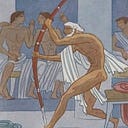MACHIAVELLI INVENTS OPTIMISM
Machiavelli devotes an entire chapter to reflecting on luck. It is chapter 25 of the 26 that make up The Prince.
Why?
Aristotle, in his Politics, does not. In The Republic and The Politician of Plato, the subject is not touched. Hobbes did not deal with luck. Popper in his political philosophy works, either. Neither did John Locke.
It is really strange that in a work of political philosophy one speaks and reflects on luck.
Machiavelli’s fate speech is just before the close of the book, just before the last chapter in which he exhorts the prince to get ignited and go and undertake a great work: to create Italy.
Next week, I’ll publish an essay on luck and Machiavelli.
But here right away, some ideas of why Machiavelli broaches the subject of luck:
The Prince wants to teach how to have and maintain power. The prince must not only know but he must internalize the limits of his power. He must be able to know his power as the athlete knows his muscles, and as the athlete he must not be confused or satisfied with the appearance.
One possible reason why Machiavelli broaches the subject of luck is that he recognized mediocre character among the Italian nobles. Today we would call that character conformism. Several times in the essay he mentions that it is very common for princes to settle for his position and enjoy it instead of protecting and expanding it. They live the lives of sybarites, not the lives of princes. In fact, when the expression “prince’s life” is used, it is not meant a life of work and struggle but a comfortable, pleasant, easy life.
Machiavelli, no doubt, strongly disagrees with that meaning. Machiavelli wants to transform the use of that expression and that the prince and we use it in another way.
This type of character that is expressed in “princely life” as an easy and gifted life has a consequence: those same princes speak as if their destiny was not in their hands. They use expressions such as “in the hands of God”, “God wants it that way”, “we have to settle for what the times bring us”. All these expressions alarm Machiavelli. If a prince internalizes them he will be unable to live as he proposes because he will assume that his life does not depend on his works.
So he will put his government in the greatest danger. A much greater danger than ambitious neighbors.
I believe that the genesis of the discourse on luck in The Prince begins with this awareness: if the prince uses the words with a certain meaning, he will believe and therefore act in a certain way. So then, something has to be done to change the meaning of the words so that they are used as they should.
The essay appears next week. We read each other!
